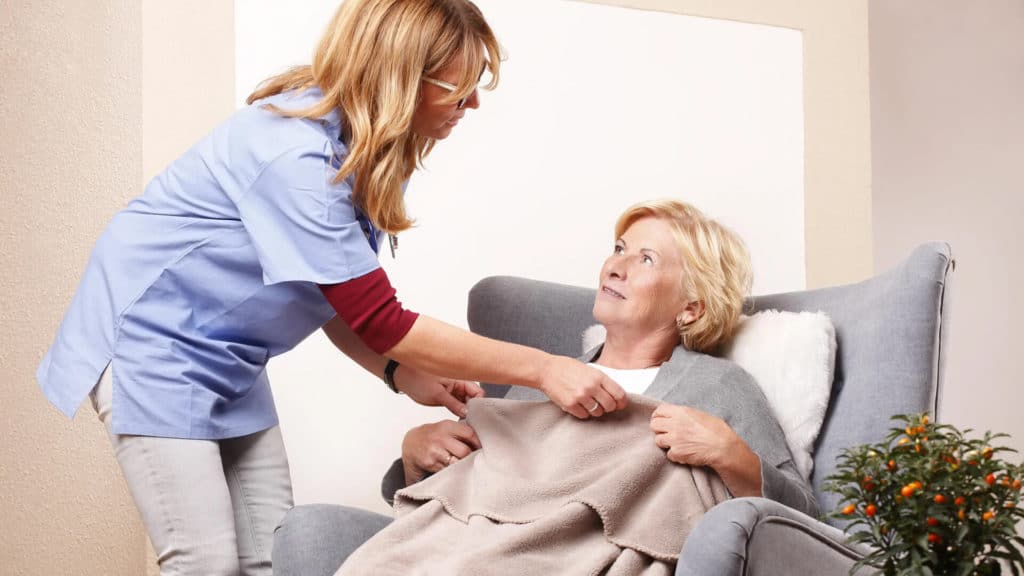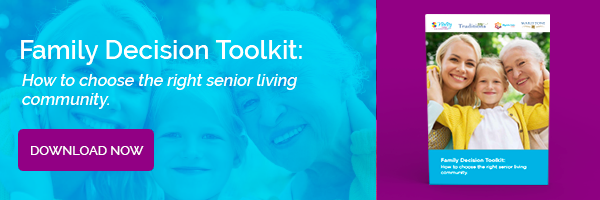“How do we know when it’s time?” That’s one of our most asked questions from families who are considering assisted living facilities. It’s also one of the most difficult to answer. Often, you have a gut feeling that it’s time or are having trouble managing your loved one’s care at home. On the other hand, you may be waiting for the “this is it” moment that provides complete clarity on what your next step should be. The reality is that there is rarely that one moment and a decision this complex and emotional is one your family ultimately has to make itself. That doesn’t mean that there aren’t subtle cues that extra support is needed. Here are common signs it’s time to look at assisted living.
Assisted Living Defined
Before you can make a decision at all your family needs a true understanding of what assisted living is and what it is not. Assisted living includes accommodations, onsite medical assistance and support with daily activities such as bathing, dressing and medication management while helping residents maintain their independence and enjoy life.
Residents love the convenience of a homelike setting without the worry of home upkeep, cooking, cleaning and yard maintenance. Social opportunities are also a huge part of daily life in an assisted living facility with all sorts of scheduled programs, activities and outings to match any interest.
An assisted living facility is not for those with medical conditions that require round-the-clock care or specialized care such as Alzheimer’s disease and dementia, although skilled nursing and/or memory care may be on the same campus.
Signs It’s Time for an Assisted Living Facility
As we said, rarely there’s that one “this is it” moment where you’ll know it’s time for assisted living. More commonly, it’s a gradual process that you may not even notice at first. That’s why the answers within these seven signs are so important.Safety
- Is your loved one leaving doors unlocked, opening them to strangers or wandering?
- Have you noticed signs of kitchen fires or appliances left on?
- Does your loved one get disoriented in familiar places?
- Have they fallen, or are they at high risk due to eye conditions, balance, medications or safety concerns in the home?
Health
- Has your loved one experienced sudden weight loss or gain?
- Do they have difficulty getting up from a chair, navigating stairs and/or around furniture?
- Have they had a recent health scare or trouble recovering from common illnesses such as colds?
- Are chronic health conditions getting worse or harder to manage?
- Is your loved one suddenly unkempt with stained and/or dirty clothes?
Tasks
- Is it hard for your loved one to keep up with yard work, house cleaning, laundry, shopping and other chores?
- Can they shower, dress, use the bathroom and manage their medications unassisted?
- Are there unpaid bills, have they been victim to scams?
- Is there unopened mail, newspapers or magazines?
- Are their plants and/or pets well taken care of?
- Is their home in disrepair?
Transportation
- Are there dents on the car or accidents or close calls while your loved one was driving?
- Have you noticed dangerous driving: too fast/slow, tailgating, drifting across lanes or confusing the gas and the brake?
- How is their reaction time and vision?
- Are they easily distracted or have they gotten lost on the way home?
Nutrition
- Are there stale, expired foods in the pantry or excessive amounts of particular items?
- Does your loved one live on TV dinners or take-out, opting to avoid cooking freshly prepared food?
Social
- What social opportunities does your loved one have?
- Are they avoiding activities which they previously loved?
- Do they have active friendships?
The Big Picture
Keep in mind that only one “yes” doesn’t necessarily mean all is well nor does agreeing with most of them mean you’ve dropped the ball. These signs aren’t an exhaustive list, rather one guiding point in your decision journey. For example, your loved one’s emotional state one should carry as much, if not more weight, than the signs above as isolation and depression factor heavily in overall health and well-being, putting them at potentially greater risk of health decline.
In the big picture, what’s most important is that your loved one gets the support they need and that everyone feels comfortable and confident the decision that it’s time to look at an assisted living facility.
For more information on selecting the right assisted living facility or exploring whether its best to stay at home or join a senior living community in general, check out our guide!




